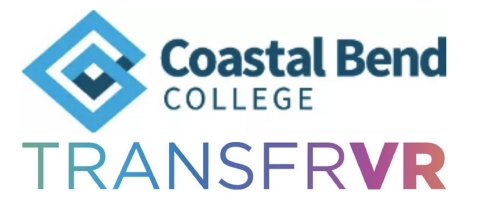Rural Texas Community College Taps Virtual Reality to Help Local K-12 Students Explore Career Options
Rural Texas Community College Taps Virtual Reality to Help Local K-12 Students Explore Career Options
Coastal Bend College uses hands-on VR simulations with rural Texas students; 83% select a career path after participating
BEEVILLE, Texas--(BUSINESS WIRE)--Coastal Bend College, a community college serving five counties in the Coastal Bend region of Texas, today announced initial results from a partnership with local independent school districts that are using virtual reality simulations to help students gain real-world experience and to explore and choose from a range of career and technical training options to pursue after high school. Built in collaboration with immersive learning startup TRANSFR, the career exploration program is boosting the college and career readiness of students in the surrounding community.
“In recent years, the growth of good jobs has actually been greatest for workers who have an associate’s degree. Against that backdrop, community colleges play an increasingly important role in preparing students for highly-skilled roles that offer career and economic stability and advancement,” said Braden Becknell, director of workforce development and continuing education at Coastal Bend College. “This collaboration transforms the traditional curriculum and paper-based tests used for career exploration into a more interactive, relevant and meaningful experience. It’s helping students experience these career options and fulfill the state career readiness requirements. The initial results are incredibly promising.”
The new career exploration program features hands-on virtual reality experiences developed by TRANSFR that provide students with an immersive, on-the-job view of a variety of technical roles and occupations—including manufacturing, architecture and construction, transportation and logistics, and hospitality and tourism. To improve the career readiness of rising middle and high school students, the Texas Board of Education instituted a requirement that students attending independent school select a career pathway before entering high school.
While Texas ranks highly among the states with the highest statewide graduation rates and high school graduates per capita, more than half of students (50.6%) were considered at risk of dropping out of high school during the 2019-2020 school year. Even before the pandemic, more than 434,000 Texas youth ages 16-24 were not attending school or working. By 2036, economists forecast that 71% of Texas jobs will require some education or training beyond high school, but only 28% of 8th graders in the state complete a postsecondary degree or certificate within six years of high school graduation.
Replacing traditional paper-based questionnaires and assessments, the career exploration simulation fully immerses students in multiple workplace settings, vividly recreated using the power of virtual reality. Based on student surveys and feedback from participating schools to date, initial results from the pilot with K-12 schools in the region are promising, with 83% of students choosing a career path upon completion. By efficiently delivering career exploration programming to large groups of rising middle school students, this program reduces the strain on district and educator resources required to help students fulfill the state’s rigorous career readiness requirement.
“As the economic recovery accelerates, it’s critical to increase awareness of the skills and career paths that not only suit their interests but translate into jobs that pay well—without necessarily requiring a four-year degree,” said Bharani Rajakumar, founder and CEO of TRANSFR. “By harnessing the power of immersive learning simulations, students can test out and experience jobs in fast-growing industries that they otherwise might have overlooked. It’s a powerful example of how we can build a classroom to career pipeline beginning in middle school, expanding access to well-paying careers and to social and economic mobility.”
To learn more, use this link to receive a recorded panel discussion with leaders from Coastal Bend College about the career exploration training.
About Coastal Bend College: Coastal Bend College (CBC) is an Achieving the Dream community college with a main campus located in Beeville, TX, along with sites serving the Alice, Kingsville, and Pleasanton, Texas communities. All CBC locations offer academic courses that transfer to a university, as well as workforce programs such as oil & gas, allied health (nursing, radiology, and dental hygiene), and business technology related industries, to name a few. In addition to educating students at our four main locations, we also have dual enrollment programs at over 24 local high schools, which means that CBC helps high school students get an affordable jump start on their collegiate careers. Annually, CBC awards over 800 certificates and degrees to both dual enrollment and college students. CBC proudly educates about 3600 students each year and is also home to six National Junior College Athletic Association (NJCAA) athletics teams. You can learn more about CBC at www.coastalbend.edu.
About TRANSFR: TRANSFR is a workforce development platform that uses simulation-based training to give students and job-seekers the hands-on skills they need to get well-paying jobs. Together with community leaders, workforce development organizations, educational institutions, and business and industry, we are building a classroom-to-career pipeline to raise up people, the organizations where they learn and work, and the communities that they call home.
TRANSFR’s hands-on simulations provide an immersive learning environment that gives students and job seekers the real-world experience they need to choose a career path and then get trained to perform it. Guided by a digital coach, they receive expert, personal instruction that introduces them to different careers, teaches them how to perform essential tasks, gives feedback based on their specific actions, and assesses progress toward mastery of skills in real time. Those who have partnered with TRANSFR have used the training to help job seekers understand their career options, develop more skilled workers, place more people in jobs, and see improved job retention rates. For more information, visit transfrvr.com.
Contacts
Ben Watsky
press@transfrvr.com
